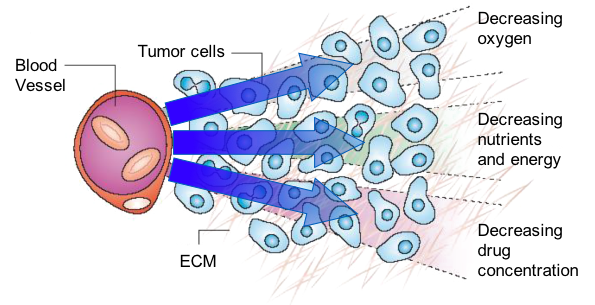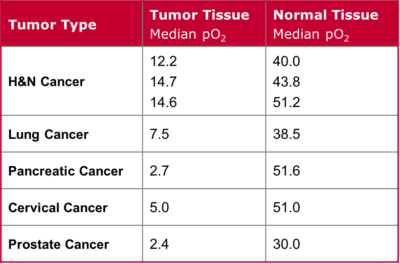Conventional chemotherapy regimens continue to be important treatment options, sometimes as first-line therapy, for many tumor types. However, depending on the cancer, high rates of treatment failures may be observed. There are multiple reasons for this. In many cases, cancers are diagnosed after solid tumors have become well established and harder to treat. Solid tumor architecture can prevent drugs from penetrating into the deepest regions of the tumor. In addition, the tumor microenvironment may favor the development of drug- and radiation-resistant tumor cell types. Thus many tumors have cell populations that are difficult to reach and difficult treat, which presents a major challenge since the high chemotherapy doses needed for effective elimination of these tumor cell populations is prevented by severe toxicity.
Cascade Prodrug’s novel chemotherapy approach has been designed to take advantage of one of the well-characterized features of solid tumors tissue—tumor hypoxia. Our proprietary hypoxia-activated prodrug switch technology provides the foundation for a significantly improved chemotherapy option for treating solid tumors—Cascade Prodrug’s Chemotherapy Trifecta™ Solution.
Tumor Hypoxia
Abnormal blood vessel growth is a recognized hallmark of solid tumor architecture. Consequently, as many tumors grow they develop “hypoxic” regions deep inside the tumor where low oxygen levels and lack of nutrients result in the development of slow growing tumor cell populations.

The table summarizes the observed oxygen levels (typically referred to as oxygen tension or pO2) in various tumor types, compared with the pO2 levels in the corresponding normal tissues. The data confirms that most solid tumors grow under hypoxic conditions. On a microscopic level, hypoxia begins to develop a short distance from the tumor blood vessels. Thus, depending on the vascularity of a particular tumor type, large hypoxic regions can develop as the tumor grows.

Tumor hypoxia is a major impediment to conventional chemotherapy since it tends to confer tumor cells with radiotherapy and chemotherapy resistance. It also promotes malignant tumor cell phenotypes and the abnormal blood vessels that leads to hypoxia also limits drug access. The poor clinical response rates in treating many tumor types is largely attributable to the failure of conventional chemotherapy to completely eradicate these inaccessible, drug-resistant tumor cell populations that are both difficult to reach and difficult to kill. Cascade Prodrug has developed a novel technology platform, known as Chemotherapy Trifecta™ Solution which leverages the hypoxic conditions found in many solid tumors, thus turning and impediment into an advantage for improving cancer chemotherapy options.


